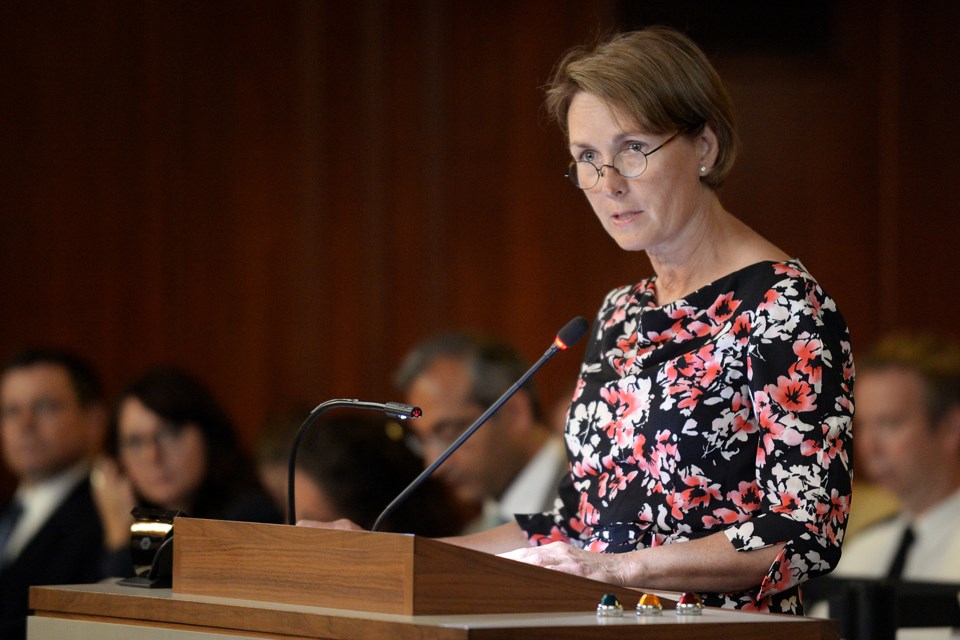A presentation by the province’s representative for children and youth at city hall Tuesday has prompted city council to support her mission to make life better for vulnerable young people in Vancouver and across B.C.
Council unanimously passed a motion by Mayor Gregor Robertson to call on the provincial government to implement a series of measures requested by Mary Ellen Turpel-Lafond and her office.
They include:
- Extending the option of foster care to 24 years old and end the current practice of youth “aging out” of the system at 19. Turpel-Lafond said many 19-year-olds in care are not prepared to become adults and frequently end up on the streets of Vancouver and on welfare.
- Create a “secure care system” for vulnerable youth and children in which they are detained, assessed and treated for the betterment of the individual.
- Add more rapid response teams to ensure children and youth at serious risk are identified and treated accordingly.
The motion also requested the provincial government “quickly adopt and implement” the recommendations in Turpel-Lafond’s recent report that focused on a 19-year-old aboriginal woman named Paige, who died in 2013 of a drug overdose in a washroom adjacent to Oppenheimer Park.

Paige, whose surname wasn’t released, died after years of abuse, neglect and what Turpel-Lafond said in her report was “persistent inaction from front-line professionals and an indifferent social care system that led to this young woman’s demise.”
Among the recommendations in the report was that the Ministry of Children and Family Development, the Ministry of Health and the City of Vancouver conduct an urgent review of the current provision of services to vulnerable children in the Downtown Eastside. Those services include child protection, housing, health care and substance abuse treatment. Turpel-Lafond also wants regular inspections of Downtown Eastside single-room-occupancy hotels to ensure children and youth aren’t living there. Turpel-Lafond estimates another 150 to 200 young people are living in the Downtown Eastside in similar situations to Paige.
Hearing that, council via Robertson’s motion agreed to order city staff to report back in the fall on what progress has been made on the recommendations in Turpel-Lafond’s report, as it relates to Vancouver. Staff will also examine setting up a regional “youth secretariat” in partnership with the B.C. government and Metro Vancouver municipalities.
Vision Coun. Andrea Reimer, who was one of many councillors to thank Turpel-Lafond for her work, asked what action the government had taken on the recommendations since the release of Paige’s story in May.
“The province has not accepted the recommendations in Paige’s report,” Turpel-Lafond told Reimer. “That’s important to note — they have not given a formal response. We’ve had a bit of a debate about the recommendations. They feel like they haven’t had enough time to think about them.”
Added Turpel-Lafond: “I’m not happy with the response and I feel that the response has been primarily lip service, and hasn’t had a presence on the ground.”
An emailed statement to the Courier from the Ministry of Children and Family Development pointed out the agency’s minister, Stephanie Cadieux, responded the day the report was released and deputy minister Mark Sieben responded in writing last month.
“The Ministry of Children and Family Development [MCFD] agrees that there are unique circumstances on the Downtown Eastside [DTES] that deserve a unique service delivery response,” Sieben wrote in his June 16 letter to Turpel-Lafond. “In collaboration with our government partners across the health, justice and education sectors and with our community-based service providers, MCFD is leading discussions on how we can strengthen the coordination of our services to improve outcomes for children and youth in the DTES.”
The ministry statement said there are more meetings planned with Turpel-Lafond’s office “that are well within the agreed upon process following a report release.”
As for the call from Turpel-Lafond and city council to set up a youth secretariat, the ministry said it is “working on solutions that will achieve the same desired results without the added cost of establishing a new office.”
For example, the ministry added, the provincial director of child welfare has set up a youth advisory council to ensure youth in care and former youth in care “can provide a voice to policy and practice discussions and initiatives.”
About 2,000 of the 8,000 children in care of the ministry live in Vancouver. And of the 700 young people who “age out” of the foster care system each year, Turpel-Lafond estimates about one third end up or want to be in Vancouver.
“So you think about that over five years, you’re dealing with a population of young people who are vulnerable and need support,” she said.
@Howellings



